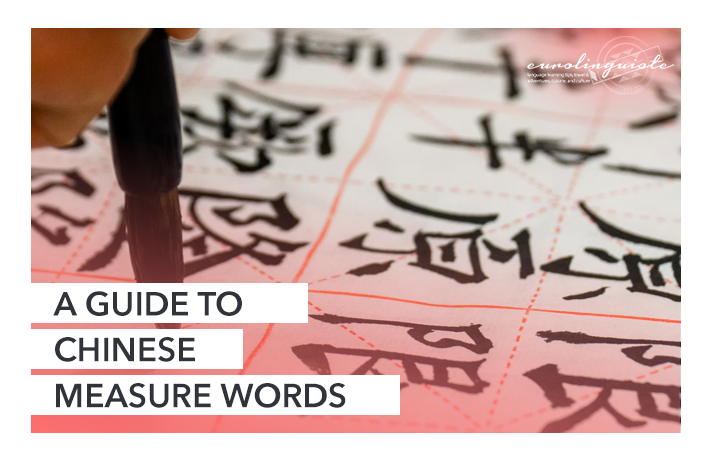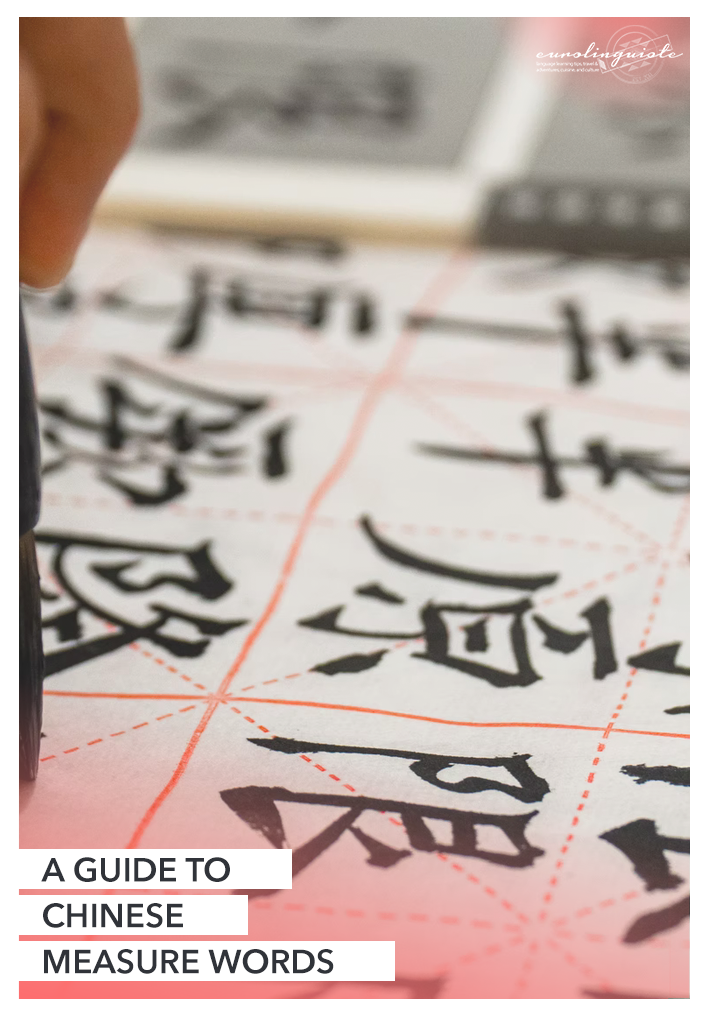A Simplified Guide to Chinese Measure Words

My name is Shannon Kennedy and I'm the language lover,…
This article has a free PDF resource available for you to download at the end of this article. Scroll down if you’d like to skip ahead and get your copy of 50+ Chinese Measure Words.
As I make an effort to improve my speaking ability in Mandarin and really get to the next level, there are a few things that I really want to hone in on and iron out.
There’s one thing in particular that I need to fine tune and it’s something that many Mandarin Chinese learners come to dread…
… Chinese measure words.
Chinese Measure Words Don’t Have to Be Difficult
One of the arguably more difficult aspects of the Chinese language are measure words. You can’t talk about anything involving numbers without them, and in Chinese, one quantifies things more often than in English.
For example, if you’re going to go talk to a friend, you’re going to go talk to yi1 ge4 peng2 you3, or one [classifier] friend, not just a friend. If you’re going to go buy some pants, you’re going to go get ji3 tiao2 ku4 zi5, or some [classifier] pants.
But measure words aren’t as foreign as we may think when we first encounter them in Mandarin Chinese.
In English, for example, we’d buy a loaf of bread, tend to a flock of sheep, wear a pair of shoes, or in French, we’ll write on a bout de papier, drink a verre de l’eau, or wear a paire de lunettes. (although, technically, this comparison can be argued, let’s not get into that and just say “close enough” for now).
What Are Measure Words in Terms of Language
Measure words (liàng cí 量词), also known as classifiers, are used to quantify nouns – or even verbs – and to identify objects.
There are technically two types of classifiers. There are:
- Count-classifiers: which do not mean anything on their own
- Mass-classifiers: which note a specific measurement such as kilo, cupful, or mile.
As far as how they function grammatically, however, the two are almost identical.
How Do I Know When I Need to Use A Measure Word?
Nouns usually require a measure word when a numeral or demonstrative word, such as this or that, precede them. And in Mandarin, this happens far more often than it happens in English. For example, you wouldn’t just say “this book”, you would say “this [measure word] book” or zhe4 ben3 shu1.
But as a general rule, it’s pretty safe to say that a measure word is needed any time you would use a number in english, use “a” or “an” , or a demonstrative word.
A measure word is not necessarily needed when describing possessions, such as in “my book” or “wo3 de shu1”.
Ready for your free list of Chinese Measure Words?
Sign up for my free language learning library and get it for free along with tons of other language learning resources.
Ten Commonly Used Chinese Measure Words
The following are the ten Chinese measure words I, in my own personal experience, have heard used the most often. This is through the context of day-to-day conversations, so if your goal is conversational Chinese, these are the 10 you’ll also likely hear quite often.
If you’d like a more in-depth list of Chinese measure words, we’ve included a free PDF of more than 50 Chinese measure words for you to download at the end of this article.
| Simplified Character | Traditional Character | Pinyin | Used For |
| 个 | 個 | gè | general measure word, for people (informal) |
| 本 | 本 | bĕn | books, magazines |
| 份 | 份 | fèn | shares, portions, copies, newspapers |
| 家 | 家 | jiā | companies, buildings, households |
| ⼝ | 口 | kŏu | family members |
| 块 | 塊 | kuài | money |
| 辆 | 輛 | liàng | vehicles with wheels except for trains |
| ⾸ | ⾸ | shǒu | songs, poems, music |
| 碗 | 碗 | wǎn | bowl |
| 位 | 位 | wèi | people (formal) |
Fun Ways to Use Measure Words
A lot of measure words can be repeated to indicate “all” or “every” so instead of saying “mei3 ge4 ren2”, one could say “ge4 ge5 ren2” to indicate that you mean every person.
Placing the measure word after the noun can also indicate an indefinite amount so rather than having to say “ji3 ben3 shu1” or “some books”, we can say “shu1 ben3” which means “the many books” or “the indefinite number of books” or just “the books”.
The Bad News About Measure Words
Unfortunately, there is only one way to learn measure words and that’s (spoiler alert) to memorize them. In my personal opinion, this is best done contextually.
I don’t suggest trying to memorize through traditional methods like flashcards or grammar exercises. Doing this will take quite some time, you likely won’t encounter all of the possible uses of them, and in result, it’s not very effective.
Instead, I feel that a better method is to listen for them during conversation exchanges or while you watch movies and listen to songs in Mandarin. Now that you have a better idea of where they might show up, it will be easier for you to pick them out.
My personal method, however, is to just use ge4 in conversations and then make a mental note when my exchange partner corrects me.
Ge4 // “Good Enough” If You’re Just Trying to Get By
If you don’t know the proper measure word, you can always just fall back on ge4. Chances are, most Chinese speakers will understand you, and as a bonus, they may even offer up the correct measure word so that you can file it away for future reference.
And don’t worry about standing out too much if you need to do this. Native speakers and children often use ge4 in the place of the correct measure word when they don’t know or remember the correct classifier. Even when they do know the correct measure word, native speakers occasionally replace the right measure word with ge4 just because they’re speaking quickly or informally.
Ge4 is a general classifier and its use has been rising, even amongst native speakers, since the 1940s. It’s often used as a classifier for people, abstract objects, and words that don’t have their own classifier.
And of course, there are always variations
Even though the list above can give you a pretty good idea of some of the most common measure words in Mandarin Chinese, there are always exceptions and variations in their use. A good example is the measure word for cars. Some people use 部 (bu4), others use 台 (tai2), and still others use 辆 (輛, liang4).
Verbs also get there own measure words at times. These include 次 (ci4), 遍 (bian4), 回 (hui2), and 下 (xia4), which all roughly translate to “times”. So, I went one time is (wo3 qu4 guo4 yi2 ci4).
Ready for your free list of Chinese Measure Words?
Sign up for my free language learning library and get it for free along with tons of other language learning resources.
Looking for More Information?
We highly recommend watching this video on measure words from Learn Chinese Now:
Further Reading
- On how well English partitives/measure words can be compared to Chinese classifiers/measure words
- Two Articles on Classifiers on Wikipedia 1 and 2.
Ready for your free list of Chinese Measure Words?
Sign up for my free language learning library and get it for free along with tons of other language learning resources.

My name is Shannon Kennedy and I'm the language lover, traveler, and foodie behind Eurolinguiste. I'm also the Head Coach of the Fluent in 3 Months Bootcamp, co-founder of Women in Language, and former Resident Polyglot at Drops.






